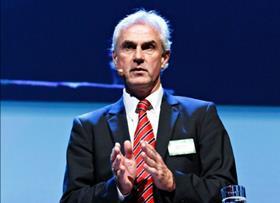
Long-term agreements, lasting relationships and value chain cooperation are the foundations underpinning the sustained growth of Bama, Norway’s largest fresh produce distributor, which has seen its turnover increase from €600m in 2004 to €1.65bn in 2013.
During a presentation at the Fresh & Life berry symposium which took place at last week’s Fruit Attraction trade show in Madrid, Bama’s CEO Rune Flaen explained how this approach also hold the key to the rapid growth in sales of fresh berries, which are the company’s largest product group within the fresh produce category and now account for 10.6 per cent of total sales. Thanks to their strong association with health, berry sales have increased by 300 per cent in Norway since 2003 and last year they made up 1 per cent of total sales in the country’s grocery market.
Flaen pointed out that the company had established integrated working models with its partners that had enabled it to build the category. “The only way to protect our unique position is to deliver growth and profitability combined with a strong position for the most important product group,” he told delegates at the conference.
He noted that in order to fully exploit the enormous potential of the berry category it is necessary to start with the right products. For the last 15 years, the company has invested in several research and innovation projects with producer organisation Gartnerhallen and several research institutes to develop new varieties that he said demonstrated the company’s long-term approach to building partnerships along the entire value chain. “The payback for all parts of the value chain has been great,” he said.
Delivering freshness and quality is also essential to ensure consumer satisfaction and Flaen highlighted some of the main logistical challenges in supplying the Norwegian market, which has just 5.1m people living in a long, narrow country more than 2,000km long.
“In a country like Norway quality and freshness have the highest priority,” he said. “The moment of truth is when the consumer meets your products and make the purchasing decision.”
Flaen stressed the need to make improvements in packaging, transportation and storage in order to increase rates of consumer satisfaction.
Another of the challenges facing the berry industry and fresh produce in general is how to effectively market products in a sector where there are few strong brands and limited marketing budgets. Around 50 per cent of Bama’s marketing budget is spent on sponsorship, which includes the Norwegian national football team and several other top athletes that act as role models to the country’s children. “We have found this to be a very efficient way to reach our main target groups: young families with children,” Flaen said.
Describing an innovative a scheme offering sports clubs a discount of 60 per cent on fresh produce purchases made at local stores for children’s tournaments, he noted this was a win-win situation: “The shopkeeper is happy and so are the kids,” he said.
He also stressed that countries should learn from each other and find new ways of communication using tools such as social media which provide fast and easy access to modern consumers.
Summing up, Flaen said value chain cooperation was the best way of exploiting the huge potential within the berry category. “Berries are one of the freshest products and really need the most efficient ways to the end consumer: Let’s close the gap!”



